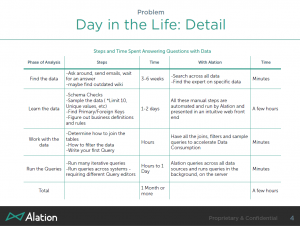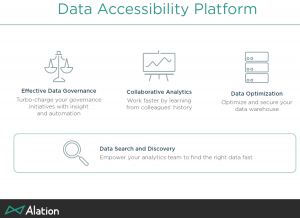Last Friday’s presenters to the BBBT were Satyen Sangani, CEO, and Anand Aidasani, Customer Development Lead, from Alation. The company is a two and a half year old startup that released its first product in March – a tool to help analysts better understand the metadata surrounding their corporate data.
One of the early and powerful statements by Mr. Sangini was that big data is more than volume and had a lot to do with the variety of data. I’ve talked about that before, so it is good to see more vendors openly admitting the fact. One caveat: They quickly JDBC, and move on. There was no mention about breadth of data accessed by their existing clients or any performance issues. When you talk with them, make sure to ask specific questions about your data sources.
You won’t be surprised when I now turn to their marketing message. They present a top level message of making it easier for business knowledge workers to get the information they need, but the product is all about the data analyst. While helping the later group does indirectly help the former, the message needs to be more focused on the analysts but with a split message about how they can both do their jobs faster and help their business clients respond more quickly with more accurate information.
They had a good ROI message for analysts, presented in the following slide.
That has a lot of good content but needs to be simplified and clarified to fit into sales and marketing messages focused at IT, analysts and end users – the challenge of true enterprise positioning.
The Platform
Their best strategic slide was the one where they present their platform with the high level goals of the firm.
Data governance. I’ve come back to it regularly, and it matters. Even a year ago, many business intelligence startups were crowing about ignoring IT and letting users do what they want. Enterprise customers have pushed back and the smart folks have listened. Modern BI needs to be about getter better data to business people faster while still ensuring that the information matches company, contractual and regulatory governance issues. That Alation lists governance first shows a strong understanding of market needs.
Alation’s collaboration is early and, again, focused primarily on analysts and other technical people. There are some great features to see SQL being used throughout the organization and analytics about the usage. What can be shared to business users who aren’t gurus needs to be improved, but it’s a young company and the collaboration they have is a great start in helping understand data as a team to speed development and improve governance.
Their platform doesn’t directly optimize queries, but there are some nice analytics available. Just as importantly, when the software identifies either an inefficient query or one that might be slow do to a large result set, a warning can be displayed to the analyst before the query is run. It’s another first generation feature that’s nice but could use more power and breadth combined, from what I could see in a short demo, a better user interface.
What Is It?
The biggest challenge for Alation is not technology, it’s marketing. What are they? They’re not an ETL tool, a pure metadata application, or a BI product. They overlap a few areas but I’m not sure where they’d be categorized by all the analyst first that feel they must categorize everything. More importantly, if the Alation management can’t figure out how to message a clear message to the market, it’s going to significantly slow the sales cycle.
My view is that they are primarily a metadata tool, but a number of BBBT members expressed dismay at the mention of metadata. The pushback was the business customers don’t understand metadata. The issue I have with that argument is that it’s an IT/analyst product and they understand metadata. For the business users who are involved in the purchase decision, Alation can certainly create content that focuses on the benefits the product brings to them, which can avoid talking about metadata, but there’s no need to avoid the word in the core content focused at their primarily technical audience.
Alation seems to be a good new tool for understand where you data is coming from to improve data governance and performance. The brief time we had didn’t get me much further than that. If you’re in need of better understanding your complex information infrastructure, spend some time with them and see what they have to offer.